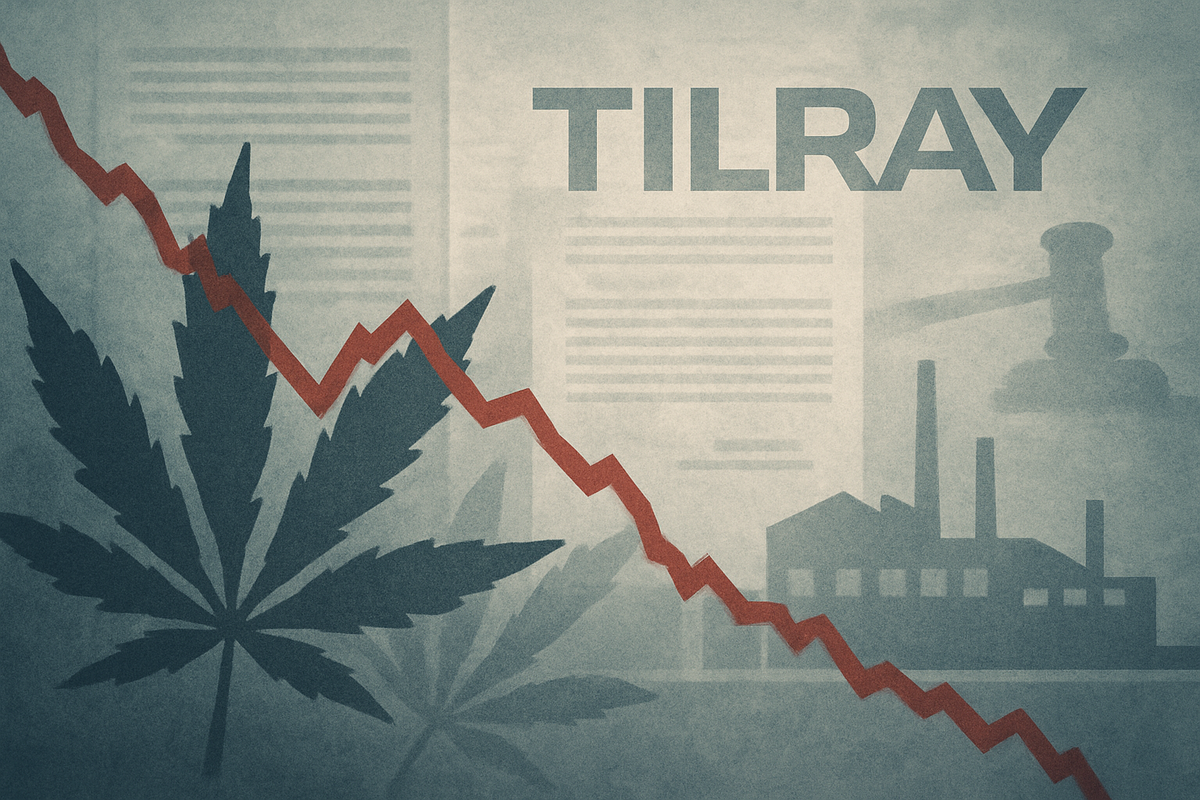Financial News
Tilray Brands Plunges Amidst Mounting FDA Approval Concerns and Regulatory Headwinds

New York, NY – September 25, 2025 – Tilray Brands Inc. (NASDAQ: TLRY) saw its stock tumble by a significant -5.21% on Thursday, September 25, 2025, as investor confidence continued to erode under the weight of persistent FDA approval uncertainties and a challenging regulatory landscape. This latest decline signals growing apprehension among market participants regarding the cannabis giant's future trajectory and the broader sector's ability to navigate complex federal and state-level hurdles. The dip reversed an earlier 4.3% gain, highlighting the extreme volatility gripping Tilray's shares as the market grapples with a confluence of operational pressures, international market barriers, and fierce competition.
The immediate implications of this downturn extend beyond Tilray, sending ripples of unease across the entire cannabis industry. While the prospect of federal rescheduling of cannabis under the Controlled Substances Act (CSA) has offered glimmers of hope, the protracted delays and conflicting signals from regulatory bodies like the DEA are fostering an environment of skepticism. Investors are increasingly wary of the sector's ability to achieve sustained profitability and growth without clear, consistent federal guidance, making Tilray's recent stock performance a bellwether for the industry's precarious position.
Navigating a Labyrinth of Regulatory Uncertainty
Tilray's -5.21% stock drop on September 25, 2025, was not an isolated incident but rather the latest symptom of deep-seated investor anxiety. This followed a similar -5.26% decline on September 10, 2025, both attributed to market concerns over regulatory challenges and the company's struggles with modest revenue and earnings growth expectations. The immediate market reaction has been characterized by sharp volatility, reflecting a delicate balance between lingering optimism for future regulatory changes and palpable frustration over current operational impediments. Tilray's stock has exhibited significant price swings over the past three months, with its weekly volatility notably increasing over the last year.
Central to these investor concerns are several critical FDA and broader regulatory hurdles that continue to plague Tilray and the cannabis sector. The much-anticipated potential rescheduling of cannabis from Schedule I to Schedule III under the CSA has been met with significant delays in 2025. The DEA administrative hearing, initially seen as a crucial step, was indefinitely postponed, and the new DEA Administrator conspicuously omitted cannabis rescheduling from his strategic priorities, despite earlier indications. This lack of concrete progress leaves the industry in a state of regulatory limbo, hindering long-term strategic planning and investment.
Should cannabis eventually be rescheduled, the FDA is poised to significantly increase its oversight, particularly for infused products and therapeutic claims. This would necessitate new requirements for labeling, Good Manufacturing Practice (cGMP) certification, adverse event reporting, and facility registration. A major challenge for cannabis, as a botanical substance, is its awkward fit into existing FDA approval pathways, prompting calls for the agency to establish a dedicated regulatory framework under the Food, Drug, and Cosmetic Act. Compounding these industry-wide issues, Tilray itself received a notice of non-compliance from Nasdaq on March 25, 2025, for failing to meet the minimum $1.00 bid price requirement. To avoid delisting, the company needed to maintain a closing price at or above $1.00 for at least ten consecutive business days before September 21, 2025, leading to a proposed reverse stock split to be voted on by shareholders in June 2025—a measure that further underscores investor apprehension.
Beyond federal agencies, the broader cannabis sector is grappling with "regulatory fatigue" due to inconsistent and constantly evolving state-level rules regarding labeling, packaging, and testing. Small and multi-state operators alike struggle to comply with these shifting mandates. Issues like inconsistent lab testing and "lab shopping"—where products are sent to multiple labs to secure the highest THC concentration—undermine product standardization and consumer trust. Furthermore, manufacturing and cultivation facilities face increasing scrutiny from OSHA over safety standards, particularly in extraction rooms. State-level regulatory missteps, such as New York's Office of Cannabis Management admitting to a miscalculation of buffer zones potentially jeopardizing over 150 dispensaries, and California raising excise taxes amidst federal labor enforcement, add further layers of complexity and cost. A looming threat is the U.S. House Appropriations Committee's consideration of redefining "hemp" to ban any product with quantifiable THC, regardless of delta-9 levels, which could decimate a substantial portion of the hemp-derived edibles and vape markets. These multifarious regulatory challenges, combined with Tilray's modest growth projections, continue to dampen investor enthusiasm for the company and the entire cannabis industry.
Winners and Losers in the Shifting Sands of Cannabis Regulation
The intricate web of FDA concerns and regulatory shifts is creating a clear bifurcation within the cannabis industry, delineating potential winners from those facing significant headwinds. Tilray Brands Inc. (NASDAQ: TLRY) itself stands at a crossroads, with its diversified portfolio presenting both opportunities and vulnerabilities.
Tilray's extensive global footprint, particularly its EU-GMP certified medical cannabis operations in Germany, positions it uniquely if the U.S. regulatory framework evolves towards a more pharmaceutical-like, FDA-regulated model. Their experience with stringent international medical standards could become a considerable competitive advantage, allowing them to adapt more readily to stricter federal oversight. Furthermore, a reclassification of cannabis to Schedule III would grant relief from the onerous IRS Section 280E tax penalties, which currently cripple cannabis companies' profitability, providing a substantial boost to Tilray's deeply negative net margins. However, Tilray's current financial health remains "troubled," marked by persistent unprofitability despite strategic international expansion and new product launches like "BC Selects" in Canada and expanded Delta-9 THC beverages in the U.S. If the compliance costs associated with heightened FDA and DEA oversight prove substantial and the benefits of interstate commerce are delayed, Tilray's unprofitability could be exacerbated. Moreover, proposed legislative bans on most hemp-derived THC products could negatively impact its growing hemp-derived beverage segment, adding another layer of risk. Analysts currently hold a "Hold" consensus rating on Tilray, with some projecting a "19% downside from current trading levels," reflecting ongoing investor caution.
Among the clearest potential winners are pharmaceutical-focused cannabis and cannabinoid developers, such as MMJ BioPharma Cultivation and Anebulo Pharmaceuticals. These companies are already operating or aiming to operate within a strict, science-backed regulatory framework. For instance, MMJ BioPharma Cultivation is advancing pharmaceutical-grade cannabinoid softgel capsules through FDA-regulated clinical trials, while Anebulo Pharmaceuticals is developing treatments for acute cannabis toxicity. A move to Schedule III would align the regulatory environment more closely with traditional pharmaceutical development, providing clearer pathways for research, manufacturing, and FDA approvals. This would significantly accelerate their drug development timelines and reduce historical regulatory hurdles, allowing them to thrive in an FDA-compliant world.
Similarly, well-capitalized Multi-State Operators (MSOs) with robust compliance infrastructure like Curaleaf Holdings Inc. (OTCQX: CURLF), Green Thumb Industries (NASDAQ: GTII), and Canopy Growth Corp. (NASDAQ: CGC) are poised to benefit. These major players, with diversified product portfolios and significant financial resources, are better equipped to meet stringent DEA registration, FDA oversight, and Good Manufacturing Practices (GMP) compliance requirements that would accompany a Schedule III reclassification. Their existing sophisticated operational structures and extensive lobbying efforts would create higher barriers to entry for smaller competitors, potentially leading to market consolidation that favors these established players. The relief from IRS 280E taxes would also provide a substantial financial boost, significantly improving their profitability. For example, Green Thumb Industries recently announced a $50 million share buyback, signaling strong confidence in its future.
Another beneficiary group includes cannabis-focused financial services providers, such as SHF Holdings, Inc. (NASDAQ: SHFS). A move to Schedule III, even without full federal legalization, is widely expected to improve banking access for cannabis businesses. This increased legitimacy and reduced perceived risk would directly benefit companies like SHF Holdings by expanding their client base and increasing demand for their specialized financial services.
Conversely, the current regulatory climate poses significant risks for several segments of the industry. Hemp-derived cannabinoid companies, especially those focused on intoxicating products like delta-8 THC, face an existential threat. Numerous smaller and larger players have capitalized on the "hemp loophole" from the 2018 Farm Bill, but legislative efforts in Congress to redefine hemp and ban most hemp-derived THC products could severely restrict or eliminate a substantial portion of their market. The looming expiration of the 2018 Farm Bill extension on September 30, 2025, further exacerbates this risk, potentially causing widespread financial losses and forcing many businesses out of operation.
Finally, smaller, undercapitalized Multi-State Operators (MSOs) or state-legal-only operators are also at considerable risk. While Schedule III rescheduling offers tax relief, the imposition of stringent FDA and DEA compliance requirements—including GMP, detailed record-keeping, and federal licensing—would likely impose significant operational and financial burdens. Many smaller players lack the capital, expertise, and infrastructure to meet these demands, making them vulnerable to being outmaneuvered by larger, more compliant competitors or facing acquisition at unfavorable terms. Without full federal legalization and interstate commerce, their growth remains limited by state borders, hindering their scalability and long-term viability.
A Glimpse into the Wider Significance: Reshaping an Emerging Industry
The current regulatory quagmire surrounding FDA approval concerns for Tilray and the broader cannabis sector represents a pivotal moment, deeply interwoven with overarching industry trends and carrying significant ripple effects. The persistent disconnect between burgeoning state-level legalization and enduring federal prohibition continues to define the landscape, creating a climate of both immense potential and paralyzing uncertainty.
A central theme driving market sentiment is the ongoing effort to reschedule cannabis from Schedule I to Schedule III of the Controlled Substances Act (CSA). The Department of Health and Human Services (HHS) recommended this change in 2023, and the DEA initiated a formal rulemaking process, with a final rule potentially arriving in late 2025. While a move to Schedule III would be a monumental step, primarily alleviating the crippling burden of IRS Section 280E—allowing cannabis businesses to deduct ordinary business expenses and significantly improving profitability—it crucially would not federally legalize state marijuana markets or automatically permit interstate commerce. This creates a bifurcated reality: state-level legalization continues to accelerate, with medical cannabis legal in 40 states and recreational use in 24, driving demand that stands in stark contrast to persistent federal barriers. This gridlock also impacts mergers and acquisitions (M&A); while current M&A activity is largely driven by distress due to oversupply, falling sales, and tax burdens, rescheduling is widely anticipated to spark a "second wave" of growth-driven M&A, as improved profitability and access to capital make companies more attractive targets. Furthermore, the burgeoning market for hemp-derived products, which companies like Tilray are leveraging through the 2018 Farm Bill's "hemp loophole," faces its own set of regulatory inconsistencies and the looming threat of potential bans.
The ripple effects of this regulatory uncertainty extend across the entire cannabis ecosystem. For competitors, particularly U.S.-focused Multi-State Operators (MSOs), the current situation creates an uneven playing field. Unlike Tilray (NASDAQ: TLRY) with its diverse portfolio including international operations and hemp-derived products, U.S. MSOs face limited access to traditional banking services, high interest rates for loans, and the inability to deduct standard business expenses due to Section 280E. Rescheduling would level this playing field by eliminating 280E for all state-legal operators, leading to improved profitability and borrowing capacity, which in turn would likely increase valuations and drive growth-focused M&A. The prospect of heightened FDA oversight under Schedule III also ignites an "FDA compliance race," where companies with existing cGMP certification and robust quality assurance protocols will gain a significant advantage, potentially marginalizing those without such infrastructure. For partners—including distributors, retailers, and research institutions—the passage of legislation like the Secure and Fair Enforcement (SAFER) Banking Act (reintroduced) is crucial. This act aims to protect financial institutions serving state-legal cannabis businesses, reducing risks for banks, credit unions, and fintechs, and thereby expanding access to vital financial services for the entire supply chain. Moreover, the current Schedule I classification severely restricts medical research; rescheduling would ease these hurdles, encouraging more clinical trials and potentially unlocking new product development.
Beyond rescheduling, several other regulatory and policy implications loom large. A move to Schedule III, while significant, would not automatically permit interstate commerce; this would require further federal legalization or specific legislation like the STATES 2.0 Act. Similarly, the U.S. currently prohibits marijuana exportation, even as international markets move towards harmonized medical cannabis regulations. Rescheduling could allow DEA-registered entities to export, but state-legal operators would likely remain restricted without further reform. The FDA might also consider creating an entirely new regulatory center for cannabis products, rather than attempting to fit them into existing dietary supplement frameworks, leading to a more comprehensive and nuanced regulatory regime for the myriad cannabinoids entering the market. Critically, rescheduling alone would not address criminal justice reform, such as expunging records, which would necessitate separate legislative action. Finally, federal oversight, especially from the FDA under a Schedule III designation, would likely lead to much stricter requirements for product safety, labeling, and manufacturing practices, addressing current industry challenges like inconsistent lab testing and potency inflation.
Historically, the challenges faced by the cannabis industry draw parallels to other significant regulatory shifts. The repeal of alcohol Prohibition in 1933 offers a compelling comparison; Prohibition led to a rise in organized crime, lost tax revenue, and an unregulated, dangerous market. Its repeal provided a much-needed boost to government revenues during the Great Depression, created jobs, and undermined criminal syndicates. Federal reform for cannabis could similarly generate substantial tax revenue, create legitimate jobs, and allow for better quality control and safer products, thereby addressing the persistent issues with illicit markets and lost tax revenue. The evolution of tobacco industry regulation by the FDA, particularly after the Family Smoking Prevention and Tobacco Control Act of 2009, provides a cautionary tale. The tobacco industry's historical resistance to regulation and engagement in misinformation campaigns highlight the difficulties of managing hazardous products against powerful industry interests. Lessons from tobacco suggest that risk-proportionate regulation is crucial for cannabis, and the industry can expect similar legal challenges and lobbying efforts, but also learn from the public health advocacy that shaped tobacco control. Finally, the pharmaceutical industry, with its stringent FDA approval processes, including rigorous clinical trials, cGMP standards, and post-market surveillance, offers a glimpse into a potential future for medical cannabis. Should cannabis transition towards a more pharmaceutical-like regulatory model under Schedule III, companies would face immense costs and timeframes for drug development and approval, potentially favoring larger corporations with substantial R&D budgets over smaller, existing cannabis businesses. The FDA's current approach to CBD, treating it as a drug if marketed with therapeutic claims, already mirrors this pharmaceutical regulatory pathway.
What Comes Next: Navigating a Future of Uncertainty and Opportunity
The path forward for Tilray Brands Inc. (NASDAQ: TLRY) and the broader cannabis sector is a complex tapestry woven with threads of regulatory uncertainty, strategic adaptation, and evolving market dynamics. As of September 2025, both short-term maneuvers and long-term visions are being shaped by the ongoing debate surrounding FDA approvals and federal cannabis reform.
In the short term (the next 1-2 years), Tilray faces the immediate challenge of maintaining its Nasdaq listing, potentially through a reverse stock split, while continuing to execute its strategic diversification. The company has shown resilience, reporting a record net revenue of $789 million in fiscal year 2024 and achieving five consecutive years of positive adjusted EBITDA, alongside a significant reduction in net convertible debt. However, negative stock forecasts for September 2025, predicting a potential drop to $1.25 per share, underscore the precarious investor sentiment. For the wider cannabis sector, the most significant near-term catalyst remains the potential reclassification of marijuana from Schedule I to Schedule III under the U.S. Controlled Substances Act (CSA) by the DEA. While a ruling from a DEA administrative law judge is anticipated in 2025, it faces potential legal and political challenges. Such a reclassification would be transformative, alleviating the punitive IRS Section 280E tax burden and improving access to banking services. Simultaneously, the European medical cannabis market continues its robust growth, projected to reach €3.2 billion by 2025, with Germany and the UK leading the expansion, offering crucial international avenues for companies like Tilray.
Looking further ahead (3-5+ years), Tilray's long-term success hinges on the successful execution of its ambitious diversification strategy, aiming for revenue streams to converge around 30% beverage alcohol, 30% cannabis, 30% distribution, and 10% wellness. This pivot away from sole reliance on cannabis, coupled with its expansion into hemp-derived Delta-9 THC beverages in the U.S. and strategic partnerships in Europe, is critical for sustained growth. The broader cannabis sector anticipates sustained global legalization and market expansion, particularly across Europe, Asia, and Africa, with the European legal cannabis market alone projected to reach USD 107.0 billion by 2035. Technological advancements, such as AI-driven cultivation and blockchain for supply chain transparency, are expected to enhance product quality and reduce costs, while the medical cannabis segment is poised for continued expansion, bolstered by increasing research and acceptance of cannabis-based therapies.
The FDA's role remains a central, often challenging, aspect of this future. As of September 2025, the agency has approved only a limited number of cannabinoid-based drugs for specific medical uses (Epidiolex, Dronabinol, Cesamet) and continues to actively track adverse health events related to hemp-derived cannabinoid products, issuing warning letters for unsubstantiated health claims. While there are signs of progress, such as FDA clearance for a cannabis-based autism treatment to enter Phase 2 clinical trials, broad FDA approval for non-pharmaceutical cannabis products remains a significant hurdle due to stringent research and testing requirements. This, coupled with the ongoing "civil war" between the marijuana and hemp industries over intoxicating hemp-derived THC products, underscores the need for clearer and more comprehensive regulatory frameworks.
In response to these dynamics, cannabis companies are undertaking critical strategic pivots. Diversification beyond core cannabis offerings, exemplified by Tilray's focus on wellness and beverage alcohol segments, is a clear adaptation to mitigate cannabis-specific regulatory risks. An intensified focus on international markets, particularly in Europe, is becoming a priority for Canadian operators like Tilray, given the fragmented and often stalled U.S. federal reform. Cost rationalization and efficiency, such as Tilray's "Project 420" which achieved $24 million in annual savings, are crucial for navigating challenging financial landscapes. Companies are also innovating in product development, with a rise in cannabis-infused beverages and wellness products catering to growing consumer demand for microdosed and functional options.
Market opportunities abound, particularly if federal rescheduling in the U.S. provides relief from 280E tax burdens, improves banking access, and attracts institutional investment. The rapidly expanding European market, product diversification, technological advancements, and increased medical research all present significant growth avenues. However, formidable challenges persist, including regulatory uncertainty and fragmentation, high taxation, limited banking access, market saturation and price compression, competition from illicit markets, bureaucratic hurdles, stringent FDA scrutiny, and rising operating costs.
Several scenarios could unfold:
- Partial Federal Reform (Most Likely Short-Term): Cannabis is rescheduled to Schedule III by the DEA, and the SAFER Banking Act gains traction. This would bring significant financial relief to U.S. cannabis companies, improve banking and capital access, and spur M&A activity. Tilray, with its diversified platform and international presence, is well-positioned to capitalize on this more favorable U.S. regulatory environment while continuing its European expansion. The FDA would likely continue its drug approval pathway for specific cannabinoid-based medicines, with stricter enforcement on non-pharmaceutical CBD and hemp products making unproven health claims.
- Stalled Federal Reform (Moderate Risk): DEA rescheduling faces prolonged legal challenges or political obstruction, and banking reforms fail to pass. U.S. cannabis companies would continue to struggle with high tax burdens, limited financial access, and a fragmented market, leading to further consolidation and a "survival squeeze" for smaller operators. International markets would become even more critical for growth for companies like Tilray. The FDA's approach would largely remain status quo.
- Aggressive Federal Deregulation (Low Probability, High Impact): Full federal descheduling or comprehensive legalization legislation passes, allowing for interstate commerce and broad federal regulatory frameworks. This would represent a paradigm shift, leading to explosive growth in the U.S. market, attracting massive institutional investment, and seeing major CPG, pharmaceutical, and alcohol companies enter the fray. Tilray's diverse portfolio positions it uniquely to compete in a fully federally legal market, leveraging its existing infrastructure and brand recognition, which would likely prompt a more formal FDA regulatory framework for cannabis as a consumer product.
In essence, the long-term success of Tilray and the broader cannabis sector hinges on their ability to adapt strategically to evolving regulatory landscapes, innovate in product development, and deftly navigate a highly competitive and often challenging market. The coming months will be crucial in determining which of these scenarios begins to take clearer shape.
The Cannabis Crossroads: A Market in Flux
The recent stock decline of Tilray Brands Inc. (NASDAQ: TLRY) on September 25, 2025, serves as a stark reminder of the persistent volatility and deep-seated regulatory challenges facing the cannabis sector. The company's shares have been under pressure throughout September, reflecting both internal financial hurdles, such as revenue falling short of estimates, and broader industry-wide concerns regarding FDA approval and federal reform. Tilray's contemplation of a reverse stock split to maintain its Nasdaq listing underscores the immediate financial pressures at play, even as it strategically diversifies its portfolio and expands internationally.
Moving forward, the cannabis market remains a landscape defined by significant uncertainty but also immense potential. While the U.S. industry is projected to surpass $40 billion in annual sales in 2025, the stark divergence between federal and state laws continues to create a complex operating environment. Mature markets grapple with price compression and oversupply, while emerging states offer pockets of robust growth. The delay in federal rescheduling efforts, coupled with legislative attempts to maintain cannabis's Schedule I status, perpetuates a holding pattern that stifles mainstream institutional investment and hinders financial stability for many operators. The FDA's cautious stance on cannabis-derived products, beyond a few approved pharmaceuticals, further limits market access and creates ongoing enforcement risks, as highlighted by recent product recalls and increased scrutiny on hemp-derived cannabinoids.
The lasting impact of this period will likely be the emergence of a bifurcated cannabis market. One segment will be a tightly regulated, pharmaceutical-grade cannabis industry driven by scientific research and FDA approvals, favoring well-capitalized companies with robust compliance capabilities. The other will be a separate, state-legal recreational and medical market that continues to operate under disparate state laws, with varying levels of consumer protection and market maturity. Companies like Tilray, with their focus on diversified portfolios beyond just cannabis and their international expansion strategies, are attempting to position themselves to thrive in both paradigms, mitigating risks associated with U.S. federal gridlock.
Investors in the coming months should closely monitor several key indicators. Tilray's Q1 earnings call on October 9, 2025, will offer critical insights into the company's financial health and strategic outlook. Any developments regarding Tilray's potential reverse stock split will also be crucial. Broader FDA regulatory updates on cannabis-derived products, particularly concerning CBD and hemp, could significantly alter market access and product lines. Most importantly, watch for progress or setbacks in federal cannabis rescheduling efforts and any related legislative actions. While a Schedule III rescheduling would provide tax and banking relief, comprehensive federal legalization for recreational use remains a distant prospect without significant legislative reform. Finally, observing the performance of emerging state markets and the continued diversification efforts within the industry, especially in ancillary sectors, may reveal more stable growth opportunities amidst the ongoing regulatory headwinds. The cannabis sector, including Tilray, remains a high-risk, high-reward investment landscape, where regulatory evolution, or the lack thereof, will continue to be the primary determinant of market direction.
This content is intended for informational purposes only and is not financial advice.
More News
View More



Recent Quotes
View More
Quotes delayed at least 20 minutes.
By accessing this page, you agree to the Privacy Policy and Terms Of Service.



